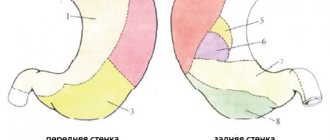Poses for burping
Here are three time-tested ways to help your baby burp. Having tried each of them, you will most likely settle on the one that is most successful for you and your baby:
1. Hold your baby upright on your chest with his chin on your shoulder. Hold him with one hand and lightly pat him on the back with the other.
2. Place your baby on your lap. The child should sit upright, hold his chest and head with one hand, and lightly pat his back with your free hand.
3. Place your baby on your lap, belly down, supporting his head so that it is higher than his chest, and pat him on the back.
Tips for helping your baby burp air
What can be helpful when you are trying to help your baby burp air:
- Slap your baby on the back only lightly in a repetitive motion.
- If you cup your palm, the pops will be softer than if you keep your palm straight.
- Place a diaper or towel on your shoulder or lap in case your baby spits up milk.
Now you know how to effectively help your child get rid of air. All techniques are shown in the illustrations below:
How to help your baby get rid of excess air
I dare to assure you that your baby will burp after eating in the first months of life in any case. Although insignificant, it will still be there. Therefore, to prevent air from the esophagus from moving into the intestines and starting to cause discomfort to the baby, you need to help him get rid of it.
- Immediately after feeding, carry the baby in a column. Lean it against you in an upright position and place the head on your shoulder. Walk in this position for about 10 minutes. If the air does not come out and the baby is still restless, then take a short break and then carry again.
- If the baby is no longer a month old and you are not afraid to lay him on his tummy (When to lay a baby on his tummy), then do it. When placing the baby on the tummy, the muscles tense, the baby takes the ideal position for air to escape, and a burp occurs. Laying it on your stomach can be alternated with wearing it in a column.
- Stroking and massages. Lightly stroking the back while the baby is lying on his tummy will only speed up the release of air. A light abdominal massage during and after meals will also not be superfluous.
How long should you hold your baby upright or on your lap?
There is no strict recommendation for how long it takes a baby to burp air. What's more important is the frequency with which you hold him in the burping position. You should let your baby burp several times per feeding, even if you think he doesn’t need it.
If you wait until your baby finishes eating, he will have time to swallow too much air, and this will cause him discomfort. Therefore, it is better to interrupt feeding from time to time and let the baby burp air.
Tips for letting your baby burp during feeding:
- If your baby drinks formula or expressed breast milk from a bottle, let him burp air after every 60-80 ml of liquid he drinks.
- If your baby is breastfed, let him burp every time you change breasts. There are breastfed babies who don't swallow as much air, so they don't need to burp it as often
- If your baby doesn't spit up air while you're holding him in a suitable position, it's okay - just continue feeding. The baby may not burp air every time.
If you notice any of the symptoms described below in your baby, try burping him more often, for example after every 30 ml of a bottle, or every 5 minutes while breastfeeding:
- gases;
- frequent regurgitation of milk;
- symptoms of gastroesophageal reflux disease (GERD);
- severe anxiety (due to obvious discomfort).
After your baby has eaten, hold him upright for 10-15 minutes. This can prevent newborns from regurgitating milk. If your baby usually burps milk or has GERD, keep him in the burping position for longer.
Other times when letting your baby burp is helpful
If your baby wakes up suddenly and you think he might be bothered by gas, try holding him in one of the burping positions. This will help release air bubbles, calm the baby, and he will fall asleep.
Babies with colic may swallow air while crying. Try to help your baby burp this air, maybe he will feel better.
WIDER POWER
- Don't focus on how quickly your baby spits up air. Your goal is to effectively help it get rid of trapped air. How to do this: ● Let him burp several times per feeding. ● Try one of these positions: 1. Hold your baby upright on your chest with his chin on your shoulder. Hold him with one hand and lightly pat him on the back with the other. 2. Place your baby on your lap. The child should sit upright, hold his chest and head with one hand, and lightly pat his back with your free hand. 3. Place your baby on your lap, belly down, supporting his head so that it is higher than his chest, and pat him on the back.
- Not all babies burp after every feeding. If you tried to let your baby burp, but nothing happened, continue feeding. He may not vomit even after he has eaten.
- There is no strict recommendation for how long it takes a baby to burp air. What's more important is the frequency with which you hold him in the burping position during the feeding process. If your baby drinks from a bottle, let him burp air after every 60-80 ml he drinks. If your baby is breastfed, let him burp every time you change breasts.
We hope these tips will be useful to you and you will be able to successfully help your baby get rid of air swallowed during feedings. After which he will be calmer and happier.
Feeding, colic, dirty diapers – parents have enough to worry about. Therefore, it is convenient to have a supply of everything you need at hand. Shopping in advance can be not only useful, but also profitable, for example if you buy Pampers diapers at a discount.
Air does not leave the stomach at night in a newborn
A famous picture: a mother holds a baby in her arms after feeding and waits for him to burp. But what is behind this? Why do babies burp, should babies really burp after eating, and what should you do if something doesn’t go according to plan? An instruction with practical advice from our expert on the problems of the little ones, neonatologist Valeria Maksimovna Shchelkunova, will help you find out.
— Valeria Maksimovna, why do newborns spit up after feeding?
- Regurgitation is the reverse flow of eaten food from the stomach into the oral cavity. Such spontaneous emptying of the stomach through the mouth in children of the first year of life can be caused by various reasons.
The most common causes of regurgitation
- too active sucking
- swallowing excess air
- overfeeding
- inadequate choice of infant formula
- feeding disorder
- early transition to complementary feeding
- vigorous exercise immediately after feeding
- allergic reactions
- autonomic dysfunction syndrome
- hereditary metabolic disorders
Causes of vomiting due to pathology
- congenital malformations of the gastrointestinal tract
- injuries to the cervical spine during childbirth
- inflammation of the gastric mucosa
Regurgitation is often attributed to the anatomical and physiological characteristics of infants. They are considered functional disorders when the clinical picture does not include pathologies of the gastrointestinal tract. Regurgitation may be a consequence of changes in bowel function. But they all have a temporary non-pathological nature - this is the most important thing.
— Until what age do babies burp?
— The frequency of regurgitation due to anatomical and physiological characteristics (no pathology) usually decreases by three months of age, and with the introduction of complementary foods they practically disappear. Regurgitation up to a year can be considered normal. With pathologies and defects, it is difficult to say when regurgitation goes away and whether it goes away at all.
— How does the passage of air differ from regurgitation of milk? What is more dangerous for a child?
— When the air is released, a characteristic belching sound is heard and a little milk may flow out. Regurgitation is accompanied by a characteristic gagging sound, and milk is released abundantly.
Almost everyone loses air (swallowing air occurs when sucking on a breast or bottle), but regurgitation of milk is a sign of a problem and a reason to look for the cause of what is happening. Regurgitation of milk is dangerous, unlike the passage of air, and can cause aspiration pneumonia when milk flows into the respiratory tract.
— Which regurgitations can be considered normal, and which ones indicate problems with the child’s gastrointestinal tract?
- Belching air and spitting out milk - up to 3-5 ml within twenty minutes after each feeding - are considered normal. Regurgitation at a later date and with a larger proportion of milk is a reason to think about it. However, a single such case does not necessarily indicate problems with the gastrointestinal tract: it may be the result of a feeding disorder, excess food, or the result of improper manipulation of the mother with the child.
In case of pathology, a clear pattern and regularity should be observed - if regurgitation of a large volume of milk occurs systematically and/or after a long period of time after feeding, you need to consult a doctor.
— Valeria Maksimovna, how do you understand that a baby cannot burp on its own?
— Not all babies necessarily burp after feeding. If regurgitation does not occur, most likely the baby does not need it.
— How to help a newborn baby burp? What burping positions are there—or what steps should a mom take to help her burp up air after a feeding?
- Carrying in a column is the most effective and efficient way to help burp after eating. After feeding the baby with formula or breast milk, the mother should hold him upright to prevent reflux and help food move further from the stomach. This reduces the likelihood of gastroduodenitis and aspiration pneumonia.
The baby should be carried in an upright position for at least half an hour. Gently pat your baby between the shoulder blades or gently stroke the baby's back to create a very gentle vibration. Until the age of three months, it is recommended to do this not only during the day, but also at night. But there should be a slight vibration, not tapping.
Mistakes that parents make when trying to help their baby burp:
- applying a hot diaper: this will not help, it is better to use it for colic to relieve gas;
- placing the baby on the stomach or massaging the tummy is ineffective and can only make the situation worse. In order not to induce vomiting, after feeding you should remain calm for 30-40 minutes, avoiding massage, baths and other active exercises;
- inhibition of the child due to unwillingness to wait for a long time. Some babies burp or spit up within a couple of minutes after feeding, while others need about 20-30 minutes. Often, impatient parents cannot stand this time - they will hold the baby a little (“put a tick”) and put the child down, who will burp after some time;
- In principle, you cannot shake the child or pat him strongly on the back - only light vibration is permissible.
— Valeria Maksimovna, what are the consequences of situations when the baby cannot burp for a long time?
- If the baby does not burp air, there may be bloating. In addition, if after feeding you do not provide the child with proper fixation in the position in a column and put him down immediately, the air will still escape, but after a longer amount of time, and the milk that is released with it, even in small quantities, can enter the lungs, which is dangerous for the child. baby. Therefore, it is important to monitor the regurgitation process.
— Does the position in which a mother breastfeeds her baby affect the nature of regurgitation?
— Problems with active regurgitation usually do not arise if the position is comfortable for mother and baby. It is important how the baby attaches to the breast - he must actively suck the nipple and areola and at the same time capture a minimal amount of air.
— Is it necessary to let your child burp before bedtime?
— Excess air will escape sooner or later. When a baby sleeps on its side or in a special cocoon, this is not critical, only the diapers get dirty. But when lying on your back, there is a danger of milk entering the respiratory tract. Therefore, after feeding the baby, you need to hold it up, especially since this only needs to be done until the age of three months.
— What techniques can be considered a good prevention of frequent regurgitation?
— When breastfeeding, it is important to ensure that the baby is correctly attached to the breast; when bottle-fed, you need to select a bottle and pacifier according to age and monitor how the baby sucks. The nipple is completely filled with the mixture so that the baby does not swallow air. It is necessary to adequately select milk formulas, avoid overfeeding, active exercises and massage after feeding. A thickener for human breast milk and anti-reflux formulas are prescribed exclusively by a doctor for excessive regurgitation and for prevention.
Regurgitation is often an anatomical and physiological feature of children under one year old. In order to understand whether they are normal or pathological, it is worth assessing the time of regurgitation after feeding and the volume of milk released. The norm is considered to be regurgitation within 20 minutes after feeding with a volume of no more than 3-5 ml. To facilitate the process of removing excess air after feeding the baby, you should hold the baby in a column for at least twenty to thirty minutes. During the process, you can create a slight vibration by patting or stroking the back. To prevent regurgitation, it is recommended to control the amount of air swallowed during feeding, ensure that the breastfeeding is correct, and when feeding from a bottle, always fill the nipple with milk.
Pediatrician Valeria Maksimovna Shchelkunova
*The ideal food for an infant is mother's milk. WHO recommends exclusive breastfeeding for the first 6 months. MAMAKO® supports this recommendation. Before introducing new foods into your baby’s diet, consult a specialist.











